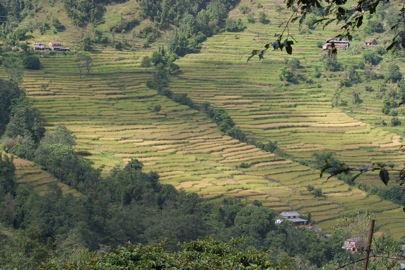![]() People say that introducing high-yielding crop varieties threatens agricultural biodiversity. Farmers adopt the modern varieties and abandon their traditional varieties, so that the overall genetic diversity falls as a result. They’re right, but not every time. A new paper published online in Field Crops Research 1 shows that genetic erosion need not be the unintended consequence of high-yielding varieties, especially if the modern varieties count farmer varieties among their parents.
People say that introducing high-yielding crop varieties threatens agricultural biodiversity. Farmers adopt the modern varieties and abandon their traditional varieties, so that the overall genetic diversity falls as a result. They’re right, but not every time. A new paper published online in Field Crops Research 1 shows that genetic erosion need not be the unintended consequence of high-yielding varieties, especially if the modern varieties count farmer varieties among their parents.
In the early 1990s, while a PhD student at Bangor University in the UK, our friend Bhuwon Sthapit, now a senior scientist at Bioversity International, was instrumental in breeding three new varieties of rice suitable for upland rice farms in Nepal. This was no ordinary breeding programme, however. Sthapit worked closely with farmers, who both set the goals of the breeding programme and participated in the selection of the final varieties from the many crosses. The varieties were selected from crosses of Chhomrong Dhan, a local landrace well adapted to the cold conditions of high-altitude rice farms in Nepal, with Fuji 102 and IR36, more productive material from international breeding programmes.

Farmers selected three lines: Machhapuchhre-3 (M3), Machhapuchhre-9 (M9, which is similar to M3 but with lower cold tolerance) and Lumle-2 (L2, like M3 with better grain quality and easier threshing). Only M3 was officially released, but M9 and L2 have been adopted widely thanks to informal seed exchanges among farmers. By 2004 about 60% of the land in the study villages was sown to one of the three COB (client-oriented breeding) varieties, while traditional varieties occupied the remaining 40%. In adopting the COB varieties, many farmers had dropped traditional landraces, but there was no clear pattern to which landraces were dropped in which villages. The variety dropped most commonly was Chhomrong Dhan, one parent of all three COB varieties.
To assess genetic diversity, Sthapit and an international team of the researchers from Bangor and Nepal analyzed DNA from the three COB varieties, a random selection of landraces and a control group of modern varieties. Overall, genetic diversity was greatest in the landraces, and least in the COB varieties. However, there was no loss of genetic diversity across the district as a whole, at least as long as the three COB varieties were adopted on less than about 65% of the land. Indeed, because the high-yielding parental varieties contribute alleles not previously known in the area, there is an increase in diversity as the COB varieties are adopted .
Another crucial result is that although some farmers grow COB varieties on 100% of their land, nevertheless, at least 11 diverse landraces survived on some 40% of the land. These landraces clearly meet needs not fulfilled by the COB varieties. For example, although the most commonly dropped variety was Chhomrong Dhan, farmers in the Gurung community continued to grow that variety.
“It is the preferred rice for preparation of the dish Madeko Bhat used during funerals and other ritual and social ceremonies,” Sthapit told us.
“The conclusion is clear,” Sthapit added. “Participatory breeding and client-oriented breeding programmes should choose locally adapted varieties as parents for breeding. It ensures that landrace genes are conserved and increases the likelihood that the breeding programme will succeed.”